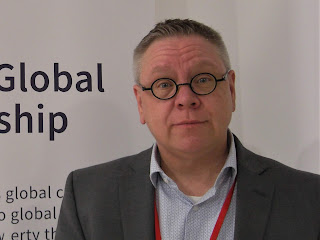A
teacher enters a classroom and is surprised to find that the students who
should be waiting for him are all missing.
“It’s
as if their absence is sending a message,” he muses in consternation.
In
fact, there is a message. Written on the desks are letters that taken together
spell: “STOP GLOBAL WARMING NOW”.
 |
| Cartoon by Floris Oudshoorn, done at ICSW 2019. |
This
is the storyline of a cartoon titled “The Educators” by Amsterdam-based artist
Floris Oudshoorn, who participated in sessions on global citizen education
during International Civil Society Week (ICSW) - an annual meeting held this
year in Belgrade, Serbia, from April 8 to 12.
Co-hosted
by the Johannesburg-based global civil society alliance CIVICUS, the event brought
together more than 850 delegates from around the world to focus on the
protection of “democratic values” and human rights, amidst increasing attacks on
rights defenders.
Oudshoorn
said his cartoon was a shout-out to the students participating in the weekly
climate strikes in various countries, calling on governments to act to decrease
emissions and fight climate change.
During
ICSW, Oudshoorn produced a series of live drawings that reflected the topics
addressed by Bridge 47, a Finland-based organization created “to bring people
together to share and learn from each other” with the help of global
citizenship education.
This
system of civic learning puts emphasis on rights, environmental awareness and
social justice - subjects that engaged participants during Bridge 47’s four ICSW
sessions, held under the title “Global Citizenship Education: Recalibrating
Action for Systemic Change”.
“With
members hailing from all continents of the world and a total of 48 countries,
the gathering provided a dynamic hub for exchanging experiences and
perspectives on the different types of value-based education,” Bridge 47
stated.
 |
| Rilli Lappalainen, founder of Bridge 47. |
The
organization used storytelling, art, communication activities and other
techniques to provide its members with “new ideas and tools” to employ global citizenship
education for social change.
Rilli
Lappalainen, Bridge 47’s founder and steering group chair, said that the
Belgrade meeting demonstrated that civil-society groups and others (educators,
artists, policy-makers) need to work together.
“It
showed how we need to allow the space for dialogue, and that dialogue is the
essence of peaceful society. If we really want to make a change, we need to
communicate and cooperate, rather than everyone sitting in their own box.”
Besides
“getting to know each other and strengthening their work”, Bridge 47 Network
members also had the opportunity to explore other topics among the host of ICSW
event sessions. These included issues such as shrinking civic space, attacks on
press freedom, and the engagement of youth, which Oudshoorn covered in his cartoons.
The
Bridge 47 sessions were also open to those outside the organization’s network
“in order to further disseminate information” about global citizenship education
as well as to “facilitate new, cross-sectoral partnerships amongst the
international civil society community”, the group stated.
Bridge
47’s name comes from “Target 4.7” of the United Nations’ Sustainable
Development Goals (SDGs), set in 2015 for achievement by 2030.
Goal
4 is to “ensure inclusive and equitable quality education and promote lifelong
learning opportunities for all”.
Target
4.7 is to ensure that by 2030 “all learners acquire the knowledge and skills
needed to promote sustainable development” through education that includes
“human rights, gender equality, promotion of a culture of peace and non-violence,
global citizenship and appreciation of cultural diversity and of culture’s
contribution to sustainable development”.
 |
African educator Bolanle Simeon-Fayomi uses story-telling
for global citizenship education, at ICSW 2019.
Photo courtesy of Troy Bjorkman / Bridge 47.
|
For
the UN, an “indicator” of Target 4.7 is the “extent to which (i) global
citizenship education and (ii) education for sustainable development, including
gender equality and human rights, are mainstreamed” at all levels.
Lappalainen
said that formal education “is absolutely needed” for this mainstreaming but that
it’s not enough.
“We
need to recognize the importance of learning outside of the school system. Part
of our work is that we advocate for governments to give the space and respect
for this kind of education,” he said.
A
key exercise during Bridge 47’s sessions was storytelling, done verbally by lecturers
such as Nigeria’s Bolanle Simeon-Fayomi who focuses on literacy for development,
or communicated through the written word or art.
In
the case of cartoonist Oudshoorn, his work is a means to educate the public by using
satire to effect social change, to promote rights and sustainability, and to
help defend activists.
“As
cartoonists, we’re between artists and journalists,” he told SWAN.
“And one of the first things that autocrats try to rub out is journalists and
artists. So, I’m in the crosshairs as well.”
Follow SWAN on Twitter @mckenzie_ale. See also https://comichouse.nl/
For more information
about ICSW, see IPS news agency stories, including: http://www.ipsnews.net/2019/04/civil-society-leaders-meet-amid-protests-attacks-rights/